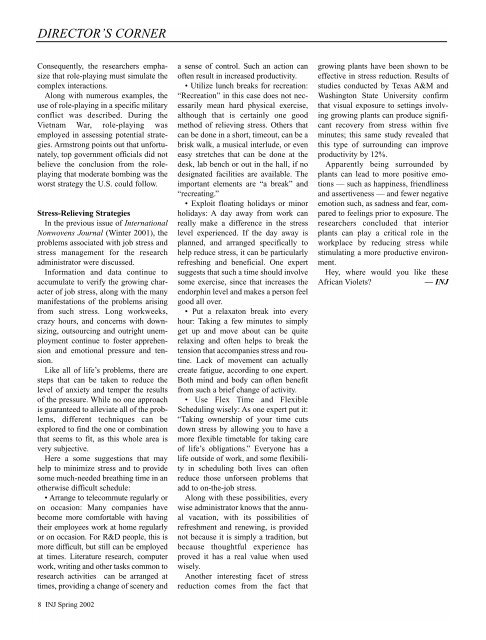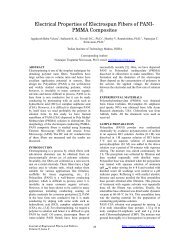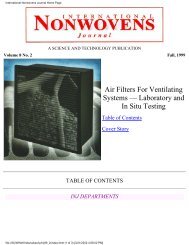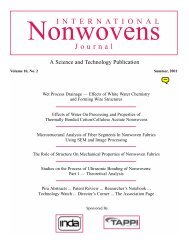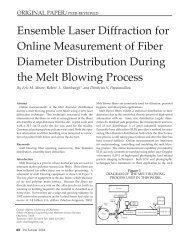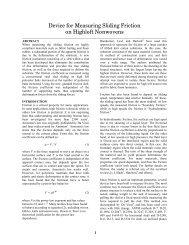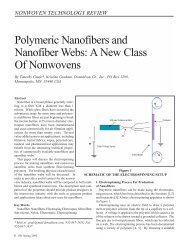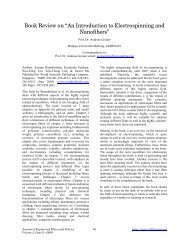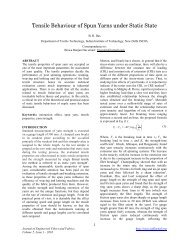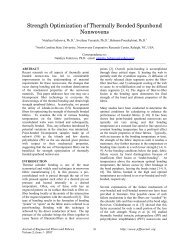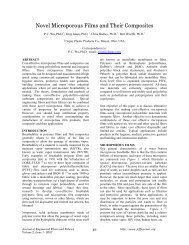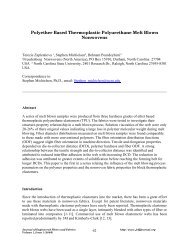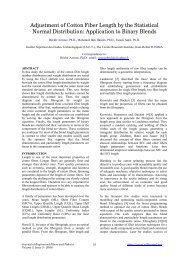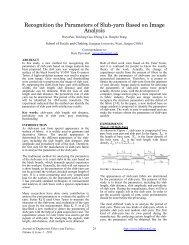2002 - Volume 1 - JEFF. Journal of Engineered Fibers and Fabrics
2002 - Volume 1 - JEFF. Journal of Engineered Fibers and Fabrics
2002 - Volume 1 - JEFF. Journal of Engineered Fibers and Fabrics
You also want an ePaper? Increase the reach of your titles
YUMPU automatically turns print PDFs into web optimized ePapers that Google loves.
DIRECTOR’S CORNER<br />
Consequently, the researchers emphasize<br />
that role-playing must simulate the<br />
complex interactions.<br />
Along with numerous examples, the<br />
use <strong>of</strong> role-playing in a specific military<br />
conflict was described. During the<br />
Vietnam War, role-playing was<br />
employed in assessing potential strategies.<br />
Armstrong points out that unfortunately,<br />
top government <strong>of</strong>ficials did not<br />
believe the conclusion from the roleplaying<br />
that moderate bombing was the<br />
worst strategy the U.S. could follow.<br />
Stress-Relieving Strategies<br />
In the previous issue <strong>of</strong> International<br />
Nonwovens <strong>Journal</strong> (Winter 2001), the<br />
problems associated with job stress <strong>and</strong><br />
stress management for the research<br />
administrator were discussed.<br />
Information <strong>and</strong> data continue to<br />
accumulate to verify the growing character<br />
<strong>of</strong> job stress, along with the many<br />
manifestations <strong>of</strong> the problems arising<br />
from such stress. Long workweeks,<br />
crazy hours, <strong>and</strong> concerns with downsizing,<br />
outsourcing <strong>and</strong> outright unemployment<br />
continue to foster apprehension<br />
<strong>and</strong> emotional pressure <strong>and</strong> tension.<br />
Like all <strong>of</strong> life’s problems, there are<br />
steps that can be taken to reduce the<br />
level <strong>of</strong> anxiety <strong>and</strong> temper the results<br />
<strong>of</strong> the pressure. While no one approach<br />
is guaranteed to alleviate all <strong>of</strong> the problems,<br />
different techniques can be<br />
explored to find the one or combination<br />
that seems to fit, as this whole area is<br />
very subjective.<br />
Here a some suggestions that may<br />
help to minimize stress <strong>and</strong> to provide<br />
some much-needed breathing time in an<br />
otherwise difficult schedule:<br />
Arrange to telecommute regularly or<br />
on occasion: Many companies have<br />
become more comfortable with having<br />
their employees work at home regularly<br />
or on occasion. For R&D people, this is<br />
more difficult, but still can be employed<br />
at times. Literature research, computer<br />
work, writing <strong>and</strong> other tasks common to<br />
research activities can be arranged at<br />
times, providing a change <strong>of</strong> scenery <strong>and</strong><br />
8 INJ Spring <strong>2002</strong><br />
a sense <strong>of</strong> control. Such an action can<br />
<strong>of</strong>ten result in increased productivity.<br />
Utilize lunch breaks for recreation:<br />
“Recreation” in this case does not necessarily<br />
mean hard physical exercise,<br />
although that is certainly one good<br />
method <strong>of</strong> relieving stress. Others that<br />
can be done in a short, timeout, can be a<br />
brisk walk, a musical interlude, or even<br />
easy stretches that can be done at the<br />
desk, lab bench or out in the hall, if no<br />
designated facilities are available. The<br />
important elements are “a break” <strong>and</strong><br />
“recreating.”<br />
Exploit floating holidays or minor<br />
holidays: A day away from work can<br />
really make a difference in the stress<br />
level experienced. If the day away is<br />
planned, <strong>and</strong> arranged specifically to<br />
help reduce stress, it can be particularly<br />
refreshing <strong>and</strong> beneficial. One expert<br />
suggests that such a time should involve<br />
some exercise, since that increases the<br />
endorphin level <strong>and</strong> makes a person feel<br />
good all over.<br />
Put a relaxaton break into every<br />
hour: Taking a few minutes to simply<br />
get up <strong>and</strong> move about can be quite<br />
relaxing <strong>and</strong> <strong>of</strong>ten helps to break the<br />
tension that accompanies stress <strong>and</strong> routine.<br />
Lack <strong>of</strong> movement can actually<br />
create fatigue, according to one expert.<br />
Both mind <strong>and</strong> body can <strong>of</strong>ten benefit<br />
from such a brief change <strong>of</strong> activity.<br />
Use Flex Time <strong>and</strong> Flexible<br />
Scheduling wisely: As one expert put it:<br />
“Taking ownership <strong>of</strong> your time cuts<br />
down stress by allowing you to have a<br />
more flexible timetable for taking care<br />
<strong>of</strong> life’s obligations.” Everyone has a<br />
life outside <strong>of</strong> work, <strong>and</strong> some flexibility<br />
in scheduling both lives can <strong>of</strong>ten<br />
reduce those unforseen problems that<br />
add to on-the-job stress.<br />
Along with these possibilities, every<br />
wise administrator knows that the annual<br />
vacation, with its possibilities <strong>of</strong><br />
refreshment <strong>and</strong> renewing, is provided<br />
not because it is simply a tradition, but<br />
because thoughtful experience has<br />
proved it has a real value when used<br />
wisely.<br />
Another interesting facet <strong>of</strong> stress<br />
reduction comes from the fact that<br />
growing plants have been shown to be<br />
effective in stress reduction. Results <strong>of</strong><br />
studies conducted by Texas A&M <strong>and</strong><br />
Washington State University confirm<br />
that visual exposure to settings involving<br />
growing plants can produce significant<br />
recovery from stress within five<br />
minutes; this same study revealed that<br />
this type <strong>of</strong> surrounding can improve<br />
productivity by 12%.<br />
Apparently being surrounded by<br />
plants can lead to more positive emotions<br />
— such as happiness, friendliness<br />
<strong>and</strong> assertiveness — <strong>and</strong> fewer negative<br />
emotion such, as sadness <strong>and</strong> fear, compared<br />
to feelings prior to exposure. The<br />
researchers concluded that interior<br />
plants can play a critical role in the<br />
workplace by reducing stress while<br />
stimulating a more productive environment.<br />
Hey, where would you like these<br />
African Violets? — INJ


